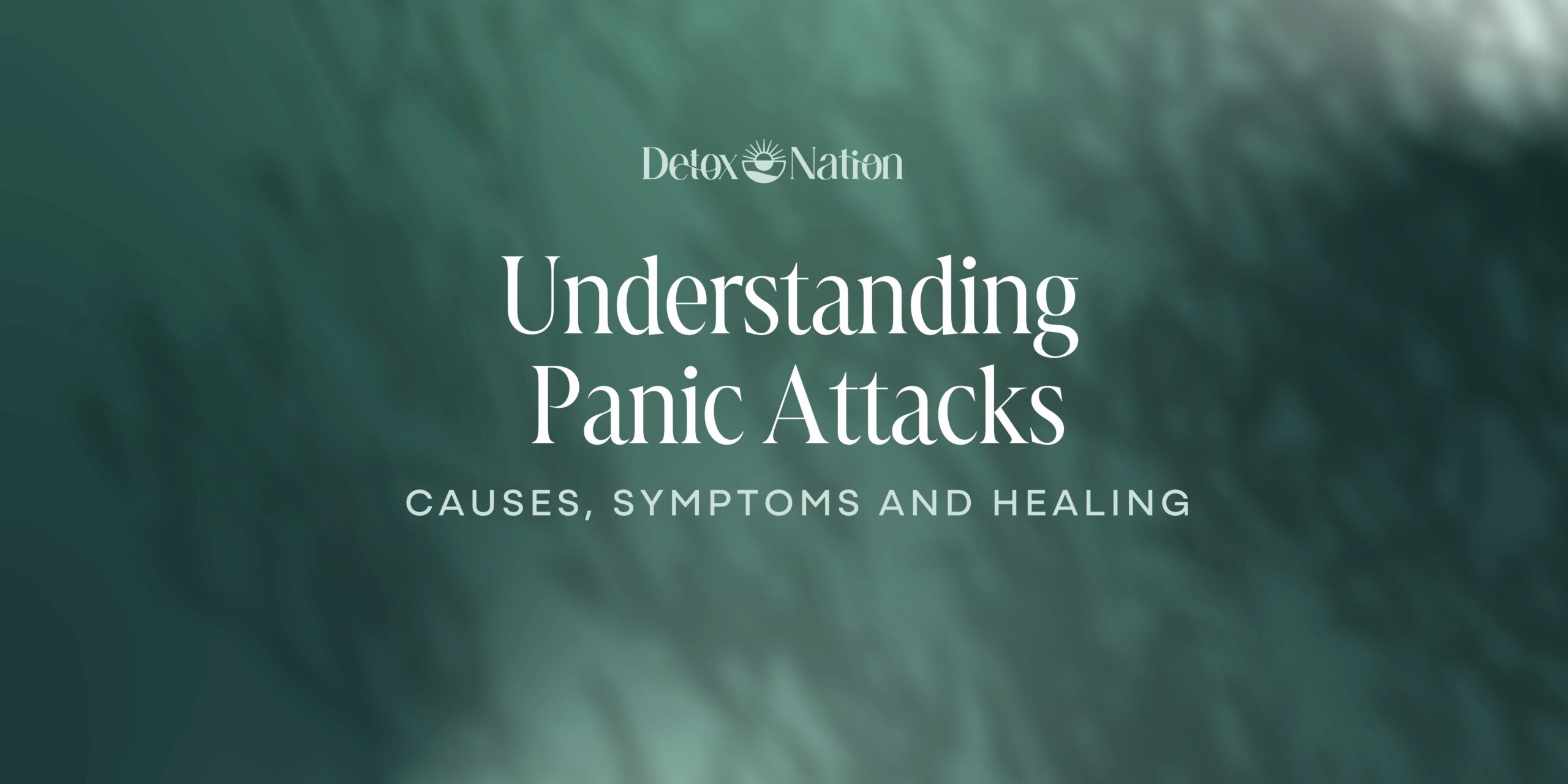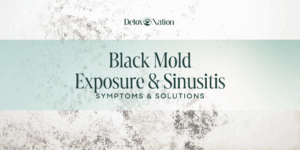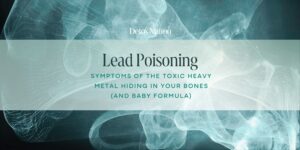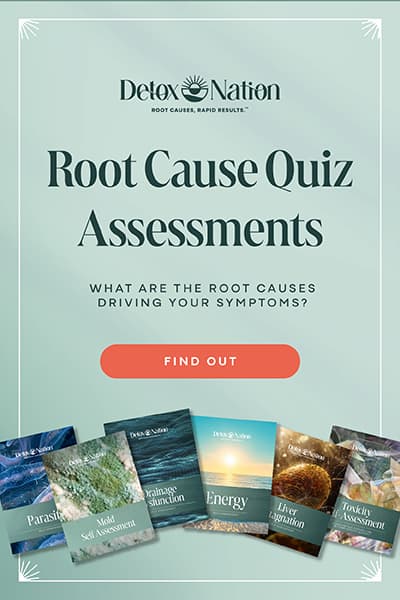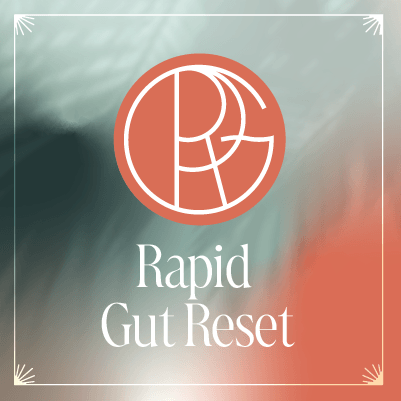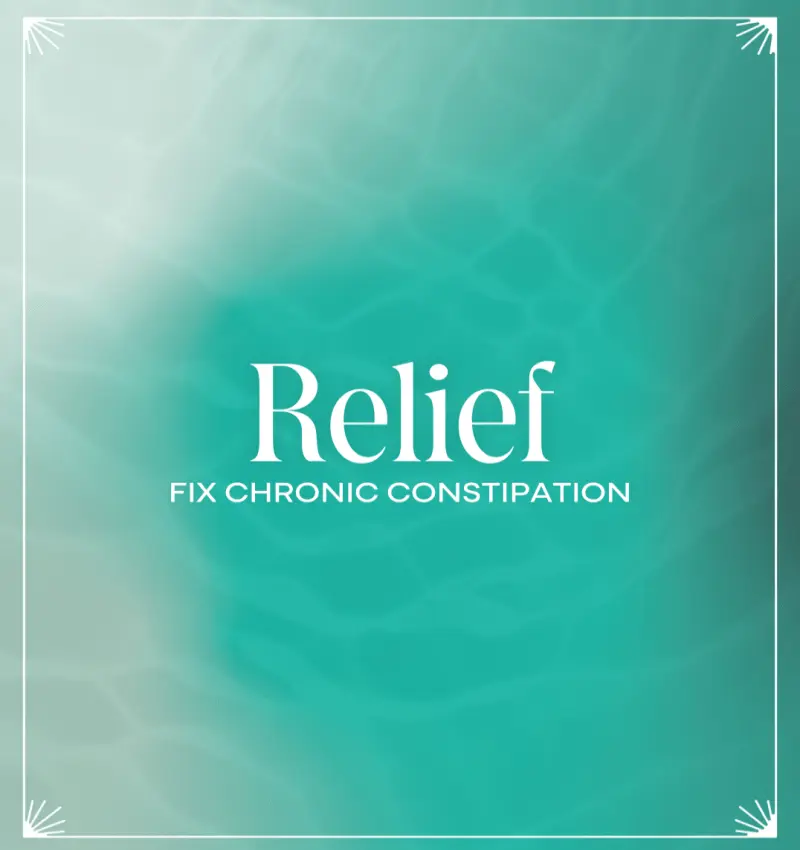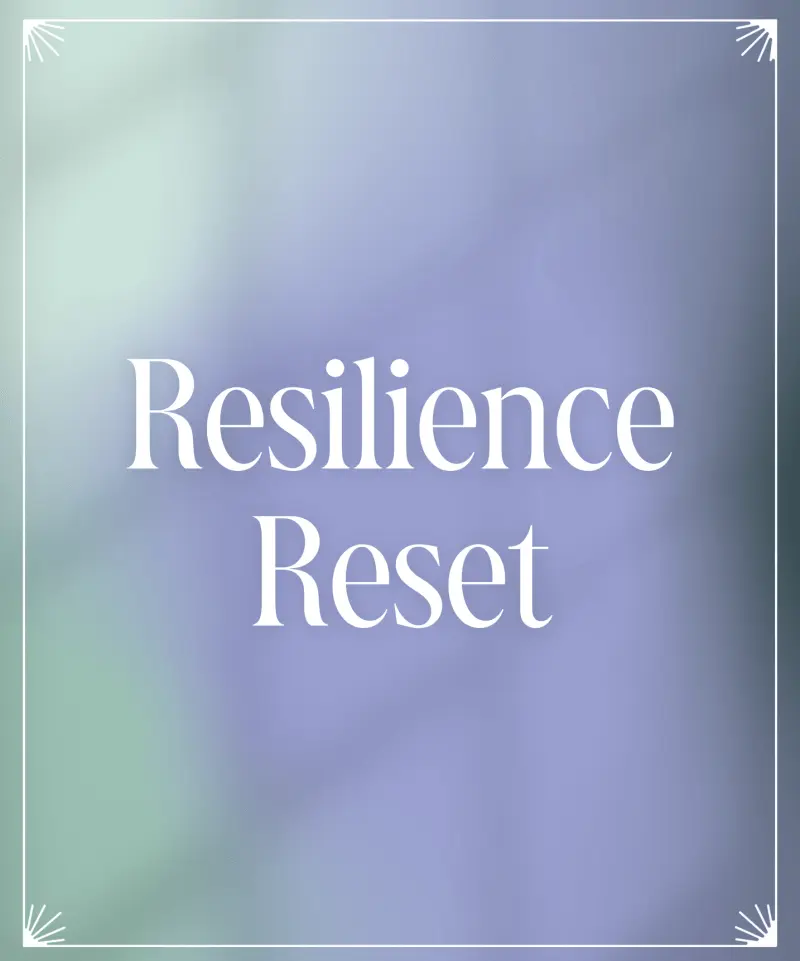Imagine feeling like you’re suffocating, heart racing, chest tight—while sitting on your couch. Panic attacks and panic disorder are intense, terrifying, and all too common. But the good news? They’re fixable! Decoding panic attack symptoms and understanding the root cause are the first steps.
Let’s face it: panic attacks suck.
There you are, minding your own business—maybe folding laundry or watching a cooking show—when out of nowhere, your heart starts racing like you’ve just sprinted a mile.
Except you haven’t moved an inch.
Your chest tightens, you can’t catch your breath, and for a moment, you wonder if this is it—heart attack, game over.
Except it’s not. It’s just your body being overly dramatic… again.
Panic attacks feel like your body is staging a full-on rebellion, but here’s the secret: your body isn’t broken.
It’s having a completely logical response, given the stresses it has been put under.
Those stress factors may not be immediately obvious, but they are real and so is your body’s response.
This can be incredibly frustrating, but the good news is it’s all fixable.
Let’s look at why your body freaks out, what triggers this cascade of symptoms, and—most importantly—how you can get control back.
Key Takeaways
- Panic attack symptoms can be physical and scary.
- Your body is doing what it’s supposed to do, but at the wrong time.
- Addressing the underlying causes of the inflammation driving nervous system dysregulation and panic attacks is crucial for healing.
What Are Panic Attacks and Panic Disorder?
Panic attacks are defined as sudden surges of intense fear or anxiety that reach a peak within minutes and include four or more physical symptoms. (Who decides these things anyway? Why not three or five physical symptoms?)
Panic attacks often have no known trigger and occur without warning (1).

Panic attacks can lead to Panic Disorder, a situation where the emotional aspects (stress, anxiety, and fear) are linked to strong sensations in the body like you would have in the case of a threat (6).
It’s time to shed some light on this topic – you’re not alone and you’re not broken.
In fact, your body is responding perfectly to the circumstance.
Before we get into why panic attacks happen and what starts the dominoes falling, let’s take a look at the symptoms of panic attacks.
Physical Panic Attack Symptoms
When a panic attack strikes, you might feel your heart racing or pounding, known as palpitations (1).
It’s like you just ran a sprint, but you might just be talking on the phone or making dinner.
This can be accompanied by shortness of breath or hyperventilation, making it hard to catch your breath (1, 6).
You might even feel like you’re suffocating, being smothered, or are starved for oxygen (1, 6).
It’s like you’re being buried alive, but you’re simply sitting at your desk working on a spreadsheet.
If that isn’t awesome enough, along comes the dizziness and lightheadedness, making you feel unsteady even though you might just be lying down in bed.
Some people experience sweating, chills, trembling, or shaking.
You might also feel nausea or intense chest pain and pressure. Yes, a panic attack can actually mimic a heart attack!
Although the physical symptoms are temporary, they can leave you feeling exhausted and drained afterward. (They last only a few minutes, but those few minutes can feel much longer!)
Non-Physical Symptoms of a Panic Attack
Along with the physical symptoms are some mental and emotional ones that can be a little scary.
You may feel a strong sense of unreality or disconnection, like you’re completely detached or outside of yourself (1).

A panic attack can cause a strong sense of impending doom, making you feel like something terrible is about to happen.
It’s no wonder you can also feel a frightening sense of loss of control during a panic attack.
And allll of this is happening with no known trigger that you perceive.
But your body did.
And it is responding perfectly to the situation.
What Do All the Symptoms Have in Common?
If you think about it, all the symptoms we’ve talked about have one thing in common:
Adrenaline.
Adrenaline is a hormone made by your adrenal glands that was designed to give your body a burst of energy during a crisis.
Look at it this way
Back in the cave-person days, you might step out of your cave,
stretching in the sunlight,
ready to start your day,
thinking about the miracle of fire…
Only to be confronted with a tiger or a bear right outside your door.
Your adrenaline would spike to help you fight the bear or run from the bear.
What would that feel like in your body?
- Increased blood flow to your arms and legs so your muscles can fight or flee, but your heart has to work hard to get it there. (Racing and pounding)
- You’ll need to get extra oxygen to your muscles so they can do their job. How does that happen? Adrenaline can make you feel starved for oxygen, causing you to breathe harder and faster to accumulate more oxygen. (Shortness of breath and hyperventilation)
- Higher brain centers – responsible for thinking, processing, artistic endeavors and more – receive less blood flow and oxygen. It’s more important to fuel the survival part of your “critter-brain.” Hence, the dizziness and lightheadedness. One study found vasoconstriction of microcirculation to deep structures of the brain during panic attacks (9).
- The adrenaline burst causes you to sweat more – this would make you slippery and harder for the predator to grasp ahold of.
- During this time, your digestive system and immune systems virtually stop. Of course they do! (Who cares if you digested your food or caught a cold if you’ve been killed by the bear?) Hello, nausea.
- This happens automatically – it’s like your body is on autopilot. You don’t need to think about it, so it can create this surreal perception of detachment or being outside of yourself.
- Feeling of impending doom? Loss of control? I should say so!
You’ve just got to give it the tools and the space to do its job properly.
Because if your body wasn’t healing? You’d be dead. But you’re not. So, let’s get to work. You can start by taking my quick Nervous System Assessment Quiz!
Take My Nervous System Assessment Now!Your body is brilliantly designed to protect you.
But here’s the thing: When was the last time you opened your front door and came face-to-face with a predator? (No, the salespeople don’t count!)
In today’s “civilized world,” we should rarely be experiencing adrenaline surges.
But they happen All. The. Time.
Why?
It’s not your fault. (And it’s not “all in your head” either.)
Your body is under attack thousands of times per day.
The foods you eat are laced with health-destroying, toxic chemicals.
The air you breathe.
The water you drink.
The world around you is filled with electromagnetic frequencies that disrupt your body’s communication and health.
Even your home may be a source of contamination – think heavy metals, mold, and more.
Your body does the best it can, but it can’t keep up
The mold, parasites, chemicals, metals, EMFs, etc. cause inflammation, neuroinflammation, abnormal immune reactivity, and dysregulation of your nervous system.
All of these are like little, teeny, tiny tigers and bears, threatening your existence.
Causing your body to dump adrenaline to prepare to defend itself.
From your body’s perspective it’s a perfect response to the multiple threats it’s facing.
It doesn’t realize that its response might be over-the-top (or is it?).
We call this Nervous System Dysregulation.
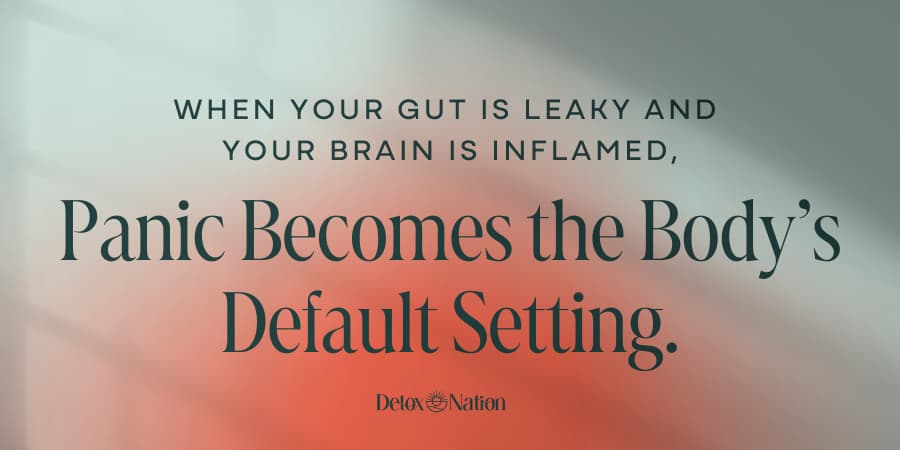
Nervous System Dysregulation
Nervous system dysregulation can lead to various physical and mental health issues, including panic attacks.
What is Nervous System Dysregulation
Nervous system dysregulation occurs when your autonomic nervous system (ANS) cannot maintain balance.
The ANS controls involuntary body functions like heart rate, digestion, and breathing.
Imagine your body’s systems constantly turning on and off without your control.
This imbalance can result in symptoms like anxiety, fatigue, and trouble sleeping.
These symptoms can seriously impact your quality of life, as the brain and body are kept in a constant state of stress.

Panic attacks can be a symptom of nervous system dysregulation.
Fight-or-Flight vs Rest-and-Digest
The autonomic nervous system has two main parts: the sympathetic and parasympathetic systems.
The sympathetic system triggers the fight-or-flight response, preparing you to face danger.
(All the adrenaline-stuff from before.)
During a panic attack, high levels of sympathetic activation are found. Sometimes it can even cause coronary artery spasm (3)!
On the other hand, the parasympathetic nervous system helps your body calm down and enter rest-and-digest mode.
It slows your heart rate, promotes digestion, and uses energy for repair and healing.
When these systems are out of sync, it can lead to overactive stress responses or chronic fatigue.
Vagus Nerve Dysfunction
The Vagus nerve is especially important as it plays a key role in regulating both systems.
It’s the largest parasympathetic nerve in the body.
It provides calming innervation to your heart, liver, kidneys, spleen, diaphragm, GI tract, your adrenals and more.
It acts like a messenger, sending signals from the brain to the body.
Vagus nerve dysfunction, an important category of Nervous System Dysregulation, occurs when this communication breaks down.
So far, we’ve talked about panic attacks, their symptoms, and the role of Nervous System Dysregulation.
But what causes the Nervous System to get all jacked up in the first place?

Root Causes of Nervous System Dysregulation (and Panic Attacks!)
Nervous system dysregulation can be linked to a variety of root causes. These include environmental toxins and detox overload, neurotoxins, parasites, inflammation, and issues within the gut.
Environmental Toxins and Detox Overload
Your daily environment contains numerous toxins, like glyphosate and heavy metals such as mercury and lead.
Think: Household cleaners, food preservatives, and personal care products
According to a 2020 EEA report, there are over 100,000 chemicals on the market. Of these, approximately 90,000 have not been well-tested in terms of hazards and health effects (15).
The spray you use to clean your windows? It contains water, 2-Hexoxyethanol, Isopropanolamine, Sodium Dodecylbenzene Sulfonate, Lauramine Oxide, Ammonium Hydroxide, Fragrance, Liquitint Sky Blue Dye.
How about the popular room-freshening spray? Water, Alcohol Denat., PEG-60 Hydrogenated Castor Oil, Fragrances, Sodium Citrate, Hydroxypropyl Cyclodextrin, Diethylhexyl Sodium Sulfosuccinate.
Hmmm – maybe the mascara you use will be better? Nope. One brand contains Water, Beeswax, Ozokerite (mineral wax), Shellac, Glyceryl Stearate, Triethanolamine, Propylene Glycol, Stearic Acid, Palmitic Acid, Sorbitan Sesquioleate, Methylparaben –
and a ton of other chemicals I can’t pronounce. Seriously? We put this on our faces? They lost me at SHELLAC!
These toxins build up in your body, causing sensitivity with repeat exposures and creating a toxic burden (5).
Over time, this can overwhelm your detox pathways, leading to toxin overload.
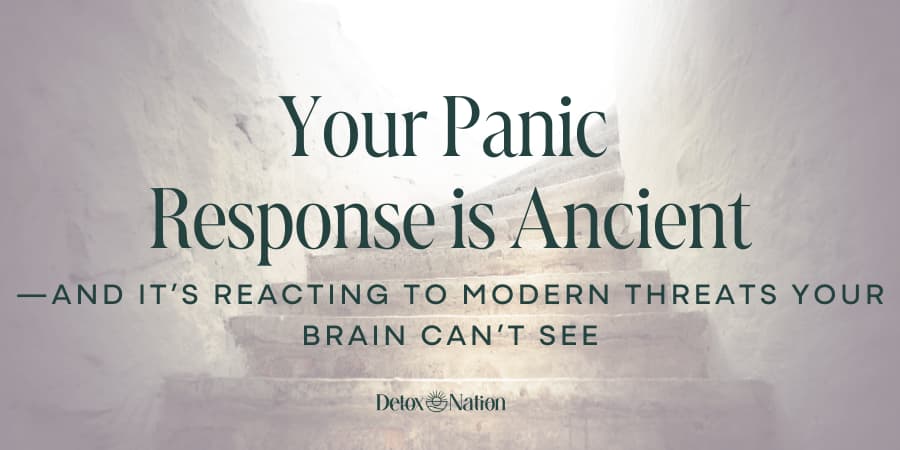
Gut Dysbiosis and Leaky Gut
Your gut health is closely linked to your brain’s function in several ways.
Gut dysbiosis—a disruption in gut bacteria balance—promotes leaky gut syndrome.
This is a condition where toxins and undigested food are absorbed back into the bloodstream instead of being excreted as waste.
That sounds gross, and it is.
It also causes a ton of problems like inflammation, neuroinflammation (via the gut-brain axis), immune dysfunction, and dysregulation in the nervous system (4, 11).
As your cells are under attack, Reactive Oxygen Species trigger oxidative stress.
Oxidative stress is like rust in your body – it degrades and destroys the health of your cells, tissues, and organs.
Your nervous system is particularly vulnerable to oxidative stress due to its high level of metabolic activity (13).
It causes protein damage, neuronal dysfunction, lipid oxidation, a loss of membrane integrity (so now the blood-brain-barrier can’t protect your brain as well), and DNA damage (8, 11).
Further, the gut microbiome influences your nervous and immune systems (and vice versa!) (12).
Essentially, anything that disrupts your gut microbiome and causes dysbiosis can lead to a reactive (dysregulated) nervous system…and panic attacks (4, 6, 11, 12, 14).
What can disrupt your microbiome and start the cascade? Mold, parasites, industrial chemicals, EMFs, heavy metals, etc.
Mold and Parasites
Mold and parasites often party together.
When they enter your body, they suppress, sabotage, and evade from your immune system.
They cause local and systemic inflammation.
And they cause dysbiosis as we reviewed before.
They can lead to histamine overload or Mast Cell Activation Syndrome (MCAS) as they trigger your Mast Cells to release histamines and other inflammatory molecules (16).
Before you know it, your imbalanced microbiome jumps in and adds to your histamine levels, gut degradation – and symptoms (17).
That’s right. Your body’s physical burden (mold, parasites, liver overload, toxins, etc.) is directly linked to your mental and emotional experience.

Neurotoxins
Neurotoxins such as mold mycotoxins, heavy metals (8), and artificial sweeteners cause inflammation and dysbiosis, and neuroinflammation.
You might have heard that some of those things interfere with neurotransmitters like serotonin, dopamine, and GABA.
But did you know that panic attacks are associated with low serotonin, B6, and iron (7)?
Inflammation and Neuroinflammation
Inflammation in the body, particularly in the nervous system, directly impact affective behavior (10). As such, it can be causally linked to anxiety and panic attacks.
Chronic inflammation can result from continual immune responses to infections, toxins, stress or food sensitivities.
As one study stated: “Inflammation and inflammation-induced oxidative stress, as well as many insidious infectious elements including in the gut microbiome, alter the expression status and epigenetics of brain non-neuronal cells (14).”
This means that the cells in the brain that protect and support your neurons are damaged by inflammation, oxidative stress, and infections in your gut!
Hopefully by now you can see that a panic attack isn’t all in your head.
It isn’t even your body turning against you.
It’s your nervous system being triggered a gazillion times a day and responding to protect you.
Even better?
It’s totally fixable!
Healing Beyond Symptom Management
When dealing with panic attacks, it’s important to look beyond just managing symptoms.
Address Root Causes and Symptoms of Panic Attacks
Getting to the root cause is essential.
Reduce your toxic load
- Replace harsh cleaners and personal care products with natural ones.
- Drink distilled water
- Use air purifiers with HEPA filters
- Purchase organic whenever possible, and wash all produce thoroughly
- Use glass containers for food storage
- Cook with stainless steel
Support and heal your gut
- Address dysbiosis-promoters such as mold toxicity, parasites, and heavy metals
- Eat organic foods and incorporate healthy fats.
- Choose foods that are non-reactive, so your diet isn’t contributing to your stress and inflammation.
Calm your nervous system
- Breathing exercises
- Meditation
- Vagus nerve stimulation
- Grounding techniques
- Mindfulness and relaxation techniques to help you stay present.
- Strategies like focusing on your senses
- Develop coping strategies to better handle stressful situations.
- Yoga and regular exercise can improve flexibility and balance, both physically and mentally.
Combining these methods with lifestyle changes can transform your approach to overcoming panic attacks.
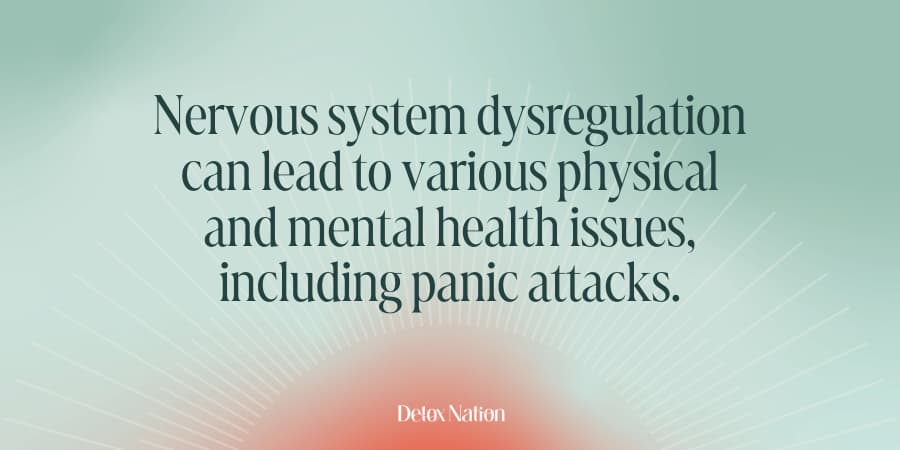
Conclusion
At the end of the day, panic attacks are just your body hitting the emergency button because it thinks there’s a threat.
The good news? That emergency button isn’t jammed forever.
You can rewire your system and teach it that, no, you’re not about to be eaten by a bear every time you get an email notification.
This isn’t an overnight fix, but it’s totally possible to calm your nervous system and ditch those out-of-the-blue freakouts.
Sure, you’ll have to put in some work (sorry, there’s no magic pill), but your body is always healing, always trying to keep you safe.
You’ve just got to give it the tools and the space to do its job properly.
Because if your body wasn’t healing? You’d be dead. But you’re not. So, let’s get to work. You can start by taking my quick Nervous System Assessment Quiz!
Take My Nervous System Assessment Now!Frequently Asked Questions
What’s the difference between a panic attack and an anxiety attack?
Panic attacks typically appear suddenly and can be intense, leading to symptoms like a racing heart or feeling disconnected. Anxiety attacks, on the other hand, build gradually and are usually tied to stressors in your life. Panic attacks are often viewed as a type of anxiety disorder because they can include fear and anxiety. Social anxiety disorder is another anxiety disorder.
How can someone deal with a panic attack effectively?
Breathing exercises and grounding techniques can help in the moment. Focusing on your surroundings and practicing deep breathing might help you manage the symptoms. Not everyone who experiences a panic attack will deal with it the same way. Ultimately, you must address what is causing your symptoms and your nervous system dysregulation.
Can having a panic attack at night mean something different?
Nighttime panic attacks may be especially unsettling. These unexpected panic attacks may occur when you’re asleep, jolting you awake with feelings of intense fear. Some believe they might be linked to stress or sleep disorders.
Do panic attacks have long-term effects on your life?
While the attacks themselves are brief, the fear of having another attack or recurrent panic attacks can be lingering. This fear might lead you to avoid certain places or situations, impacting your daily life and activities. Physical symptoms of a panic attack can feel like a heart attack, causing the severity of the panic to increase.
How long do panic attacks last?
The panic and anxiety and physical symptoms of panic attacks can happen without warning and can last several minutes. The symptoms usually peak within a few minutes. People who experience panic attacks usually describe them as feeling much longer.

